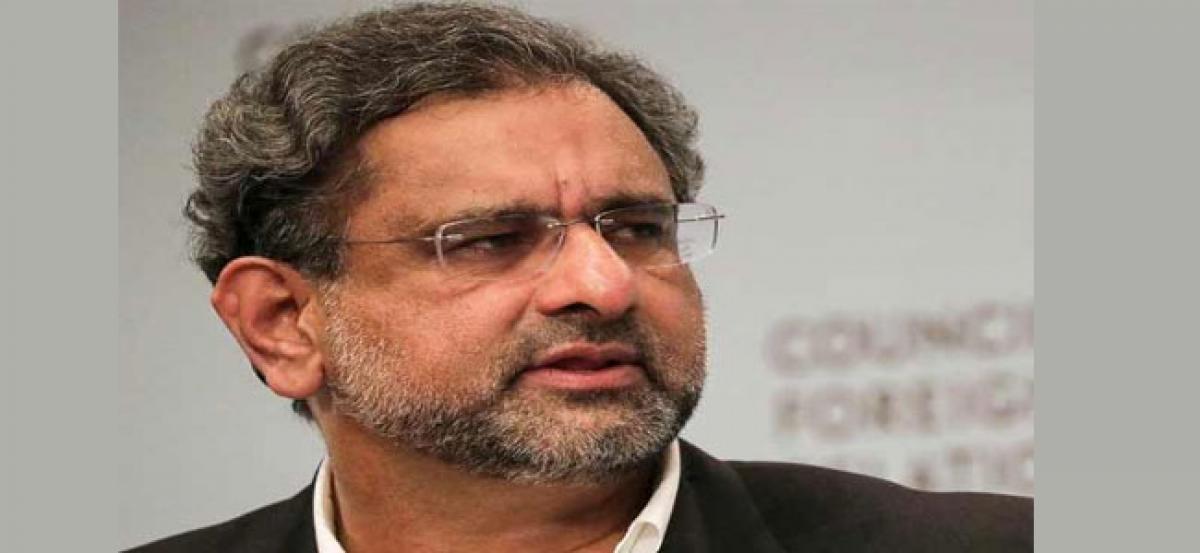Live
- YSRCP to boycott elections to WUAs
- Farmers led by YSRCP leaders stage protest against graft
- MLA Dhanpal reminds Cong of promise of gold for brides
- Dy CM Pawan hails Swarna Andhra@2047 vision document
- Ensure success of Mathematic Talent exam
- Atchannaidu expresses concern over fall in tomato price
- Goshamahal Welfare Assn petition Collector seeking withdrawal of Osmania Hosp plans at stadium
- Indiramma Housing scheme 4L applications received in RR dist
- 3 Indian students killed in Canada; India takes up issue of safety with Ottawa
- Sana Satish Babu elected unanimously for RS
Just In

Prime Minister Shahid Khaqan Abbasi is in Washington D.C. for a day and is using his short visit to meet American Congressmen and officials.
Washington: Prime Minister Shahid Khaqan Abbasi is in Washington D.C. for a day and is using his short visit to meet American Congressmen and officials.
According to media reports, the Pakistan Prime Minister's visit comes just days after Foreign Secretary Tehmina Janjua visited Washington for a series of what is being described by observers, experts and diplomats as fence-mending discussions with the U.S. leadership.
On Friday, Prime Minister Abbasi and officials of the Pakistan Embassy met among others with Congressman Ted Yoho, Chairperson of the Subcommittee on Asia and the Pacific.
Foreign Secretary Tehmina Janjua visited Washington on March 7 and 8, where she met senior US officials, including Deputy Secretary of State John Sullivan Deputy National Security Advisor Dr. Nadia Schadlow and had in depth discussions with South Asia experts at the US Institute of Peace (USIP). She also interacted with US media.
Janjua had then reiterated Islamabad's desire to strengthen its long standing relationship with Washington and emphasized the need for continued constructive engagement across the entire spectrum of bilateral relationship. She underscored that a mutually beneficial Pak-US relationship underpinned by mutual respect would serve the common interests of both countries.
Principal Deputy Assistant Secretary for South and Central Asia Alice Wells had then described Janjua's visit as the beginning of a process with the Pakistani government
Relations between Pakistan and United States have been strained since December last year after President Donald Trump issued a stinging warning to Islamabad to be more proactive on the War on Terror and to stop giving sanctuary to known terror elements such as the Haqqani Network, the Afghan Taliban, the Quetta Shura, the Lashkar-e-Toiba, the Jaish-e-Mohammad and the Jamaat-ud-Dawa.
In January this year, President Trump, through a tweet, accused Pakistan of providing safe haven to terrorists, signaling that ties between the United States and Pakistan were going southward.
In a harsh criticism of Islamabad, President Trump said then, "The United States has foolishly given Pakistan more than 33 billion dollars in aid over the last 15 years, and they have given us nothing but lies & deceit, thinking of our leaders as fools."
He further stated, "They give safe haven to the terrorists we hunt in Afghanistan, with little help. No more!"
Pakistan Foreign Minister Khawaja Asif had then responded: "We will respond to President Trump's tweet shortly inshallah ... Will let the world know the truth ... difference between facts & fiction."
It was then unclear what triggered President Trump to openly criticize a longtime security partner in South and Central Asia, but it seemed to have made clear that nuclear-armed Pakistan needed to do much more to clamp down on Islamist militants if it wanted to continue to receive American aid.
Foreign Minister Asif has also had discussions with the American leadership post President Trump's controversial tweet.
Pakistan, on the other hand, has alleged that Washington has done little to control security in eastern Afghanistan, which lies on its border.
Other issues that have bedeviled the relationship include the Raymond Allen Davis incident in Lahore, wherein Davis reportedly shot dead two armed men on January 27, 2011 and thereafter returned home protected by diplomatic immunity because of his then employment with the U.S. Consulate in Lahore; the secret U.S. Seals operation in Abbottabad which resulted in the death of Osama bin Laden on May 2, 2011 and the Salala incident, where and when US-led NATO forces engaged Pakistani security forces at two Pakistani military check posts along the Afghanistan-Pakistan border on November 26, 2011 in which 24 soldiers were killed.
Public opinion in Pakistan frequently ranks the U.S. as one of its least favored countries, and vice versa.
In 2015, according to a Gallup annual World Affairs survey, only 15 percent of Americans had a favorable view of Pakistan.
The United States is currently the second-largest supplier of military equipment to Pakistan after China, and is one of Islamabad's largest donors of foreign assistance.

© 2024 Hyderabad Media House Limited/The Hans India. All rights reserved. Powered by hocalwire.com







